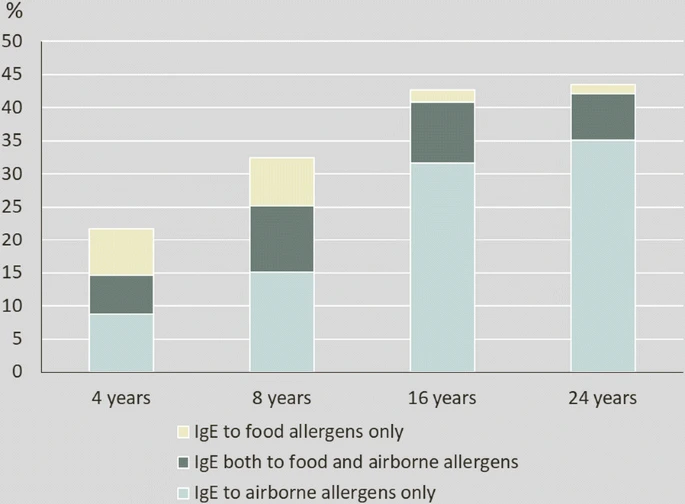Abstract
Background
Up to half of the population in high-income countries has allergen-specific IgE antibodies. However, data regarding sex differences of IgE-sensitization from childhood to adulthood is limited.
Objective
To explore IgE-sensitization to common foods and airborne allergens in relation to sex over time in a population-based cohort followed up to young adulthood.
Methods
The Swedish population-based birth cohort BAMSE includes 4089 subjects who have been followed regularly with questionnaires and clinical investigations. A recent 24-year follow-up included 3069 participants (75%). Sera collected at 4, 8, 16 and 24 years were analyzed for IgE-antibodies to 14 common foods and airborne allergens.
Results
At 24 years sensitization to foods had decreased compared to previous follow-ups affecting 8.4%, while sensitization to airborne allergens was more common, affecting 42.2%. Male sex was associated with IgE-sensitization to airborne allergens at all ages (overall OR: 1.68, 95% CI 1.46–1.94) while there was no statistically significant association between sex and sensitization to food allergens (overall OR: 1.10, 95% CI 0.93–1.32). Levels of allergen-specific IgE did not differ significantly between males and females for any of the tested foods or airborne allergens at any age, following adjustment for multiple comparisons.
Conclusion
IgE-sensitization to airborne allergens increases with age up to young adulthood, whereas sensitization to food allergens seems to level off. Male sex is strongly associated with IgE-sensitization to airborne allergens from early childhood up to young adulthood. In contrast, there is little evidence for associations between sex and IgE-sensitization to foods.

No comments:
Post a Comment